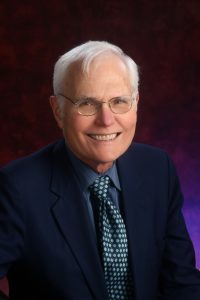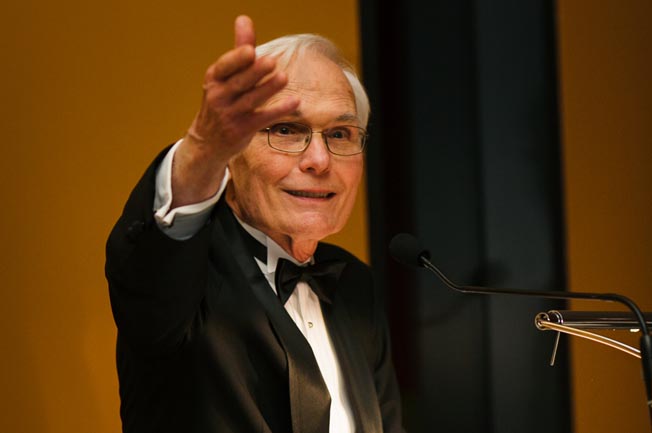Many of us go through college without a clear career path in mind. But a lucky few have the great fortune of knowing their true calling at a very young age.

For Speight Jenkins (BA, English ’57), that passion was opera. It all began in the early 1940s when a first grade teacher introduced his class to opera music.
“After class I hurried home and asked my parents about the opera,” Jenkins says. “I was completely fascinated when my mother told me about an unusual story in which a father puts his daughter to sleep in a ring full of fire. She showed me a book about the Ring cycle—and from that moment forward I was hooked.”
Since his first encounter with Richard Wagner’s famed Ring cycle—an epic story of the clash between love and power, gods and men—Jenkins was caught in his own star-crossed love story. He believed a lucrative career in music was impractical and unattainable, yet he couldn’t resist the gravitational pull toward the Metropolitan Opera.
“I always wanted to work in the opera, but my parents wanted me to become a professional man,” Jenkins says. “So I chose to study law in New York City because it was close to the Met.”
Despite his best efforts to finish school, he couldn’t resist the urge to visit the Met when he should have been hitting the books. After an unsuccessful freshman year, he returned to his home in Dallas to regroup. Eventually he found a way to balance the opera with his undergraduate studies at UT Austin, and after graduating in 1957 he went on to receive his law degree at Columbia University in 1961.
It wasn’t until he enlisted in the U.S. Army that he discovered a musical career path in a very unlikely place.
“This might be hard for you to believe, but I really enjoyed being stationed in Iran,” says Speight, who served four years as a member of the Judge Advocate General’s Corps. “It’s where I began my first work in opera while leading the classical music program for the Armed Forces Radio Station. I eventually turned it into a full season of opera.”
When he returned to New York in 1966, he wanted to continue his budding career as a music critic, so he ventured into freelance writing. He later became the editor for Opera News and contributing writer for the New York Post. When he landed his dream job as host for the Live from the Met telecasts, it seemed as though he reached the pinnacle of his career. He never imagined that one day he would sit in the director’s chair at the Seattle Opera, one of the most prestigious opera companies in the nation.
“I was incredibly surprised when the search committee asked me to be a candidate,” Jenkins says, recalling the early 1980s when he served as guest lecturer for the Seattle Opera. “People thought they were crazy because I never did anything administrative. Never would I have imagined leaping into the director position of an opera company. It’s a big jump.”
But this was a jump he was willing to take. Thirty years– and nine successful productions of the Ring cycle later—he can say without a doubt that it was well worth the risk.
“This is what I was born to do,” Jenkins says. “The best piece of advice I could give anyone is that if you’re working in a field that you enjoy and people offer you an opportunity—never say no. You’re never going to get a second chance at that opportunity.”
Being a general director for an opera company is a huge undertaking, Jenkins says. It is the only art form in which the director oversees the entire operation – from fundraising to publicity to education outreach to stage production. Much like a ship’s captain, the director must steer the company in the right direction while heavily relying on a hard working, dedicated crew of shipmates.
“Any opera company reflects the pace of the director,” Jenkins says. “It is a complex, collaborative process that requires a great group of people who are working toward the same goal over a long period of time. I’ve drawn a remarkable group of people to this company and kept them on staff for years. That’s more important than any specific success in the opera.”
Because of his passion for the arts and energetic leadership style, Jenkins has been listed as one of the top leaders in the opera industry. Among his many awards, Opera News named him as one of the 25 most powerful leaders in American opera. The Seattle Times also cited him as one of the 150 most influential people who have shaped the character of Seattle and King County. He attributes much of his success to his passion for the arts, and hopes to inspire more young people to experience the opera at least once in their lives.
The challenge, Jenkins says, is getting people to sit through a long performance without reaching for their cell phones. But once they’re able to immerse themselves fully into the performance, they might see the connections between the fantastical story unfolding onstage and their own personal struggles.
“I’ve always loved and enjoyed the Ring cycle tremendously,” Jenkins says. “The story involves gods and goddesses, but really it’s about people. What I love about this particular production is that if it’s done properly, people will really enjoy it because they can see how the story applies to every human situation.”
To this day, Jenkins is unable to pinpoint the reasons behind his love for the opera. But he can say without a doubt that it has been a great source of happiness throughout the years. And even though he’s taking a final bow from the Seattle Opera this fall, he plans to spend his retirement years writing about his lifelong passion. In addition to freelance writing, he’ll also continue critiquing the opera scene in his forthcoming blog Straight from Speight.
“Why do I love the opera? I have no idea,” Jenkins says. “I could never answer that question. There are some things you’re just drawn to in life. For me, it was—and will always be—the opera.”
